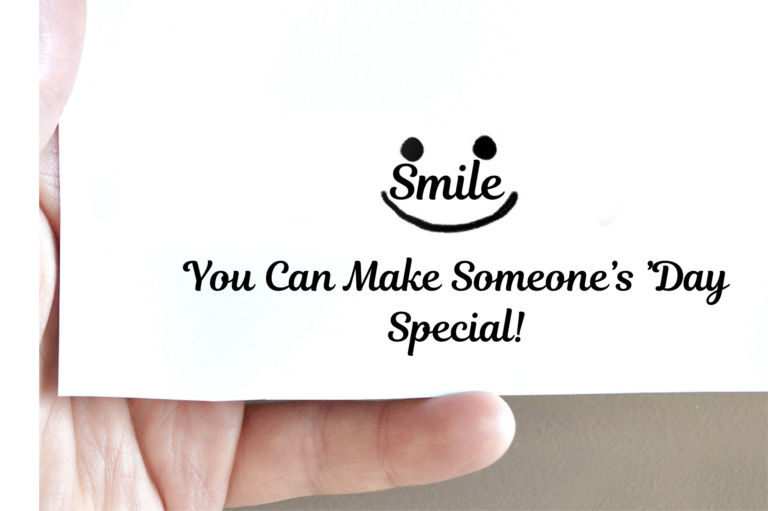The new Semester had commenced, and I walked into college looking forward to meeting a new set of students. As I walked in, I saw a student and smiled at him. He seemed confused and looked around to see if I was smiling at someone else.
I walked away amused at the student’s reaction to my smile. I found the same boy on one of the back benches as I entered the classroom. After the initial introductions with the students in the class, I asked, “How many of you smiled at some unknown person this morning?” To my surprise, just a few of them raised their hands! I realized that smiling was not easy for everyone. When I asked why they didn’t smile, they shared reasons.
Reasons For Not Smiling
- I’m shy, I’m an introvert.
- I’m a bit unsure of reactions if I smile.
- I have crooked teeth and I’m very conscious about it.
- Someone may think something is wrong with me.
- What if someone doesn’t reciprocate?
- What is there to smile about?
- I don’t notice others as I am usually preoccupied.
- I am away from home and miss my family. I feel lonely and depressed at times.
- I’m new to this city and have no friends so I feel lost!
These reasons can be broadly categorized into four areas:
- Personal disposition: Some people have a serious expression. They may be shy, introverts, or don’t feel the need to smile constantly. Cultural background and family upbringing can also make them smile less frequently than others.
- Self-consciousness: Some are self-conscious about their smile for reasons such as having crooked teeth, a bad set of teeth, or not having sparkling white teeth. This makes them hesitant to smile freely.
- Emotional state: If someone is feeling depressed, stressed, or lost, they’re less likely to smile. Unpleasant experiences of the past also become a deterrent to smiling. An unsmiling face is a natural reflection of their mood being low.
- External factors: Things like being on the phone or being in a crowded place where too many things are happening, and an overwhelming environment can make people less likely to smile.
While you may have reasons not to smile, I want you to know that the power of a smile is phenomenal.

10 Reason To Smile
Let me help you understand what a genuine smile can do:
- A smile is the best Universal language that connects people. Even in an unfamiliar place or among unfamiliar people, a simple smile can open the doors to start conversations or create connections with people. A smile can make someone’s day!
- Behaviour Scientists have done a good amount of research and found that our emotions bring changes to our bodies and the brain also pays attention to our bodies and affects our emotions. When you smile, you feel relaxed and confident in front of people. A smile is a great way to start your presentation in front of an audience as you look calm and confident. This in turn makes the audience more receptive.
- There is a myth that you smile only when you feel good. Well, it is the other way too, you feel good when you smile. When you smile, you feel at ease and connect with the other person as they reciprocate with a smile.
- Research shows that smiling helps to increase mood-enhancing hormones and decrease stress-enhancing hormones like cortisol, and adrenaline. It also reduces overall blood pressure. When you smile, the muscles trigger your brain to produce more endorphins—the chemical that relieves pain and stress.
- A smile is free but a priceless gift. To give a smile doesn’t cost you anything, yet, it has the power to cheer up someone and make their day better. A smile is also contagious, it spreads more smiles and improves the mood around you.
- Smile makes you look attractive. You remember people because of their dazzling smiles! A person who smiles appears confident, warm, and approachable. It can make you appear more friendly, inviting, and attractive to others.
- Smiling is a universal expression of joy and openness. It establishes a positive and pleasant atmosphere when engaging with others, making you likable, approachable, and reliable.
- A genuine smile conveys warmth and openness, making conversations more enjoyable and effective. It can facilitate better understanding and empathy among people.
- A smile helps in building trust: A genuine smile can create a sense of trustworthiness and credibility, making it easier for others to rely on you. It can enhance teamwork, collaboration, and cooperation in personal and professional relationships.
- Smiling increases longevity: Research suggests that smiling and maintaining a positive outlook contributes to a longer lifespan by reducing stress, enhancing overall well-being, and promoting better health practices.
Thus, you see the power of a smile and its vital role in connecting people by promoting positivity, building rapport, fostering empathy, and establishing a friendly environment for meaningful interactions.
Every time you look at a camera while being photographed, you look at the lens and smile because you like to be remembered as a person with a smiling face.
In the same way, every time you look at someone, look at their eyes and smile. Their mind clicks an image of you every time you look at them. This image is stored in their memory. The mind has no delete button! Keep smiling and you will surely be remembered as a person with a smiling face!
Now that you know the power of a smile, start your day with a smile!





